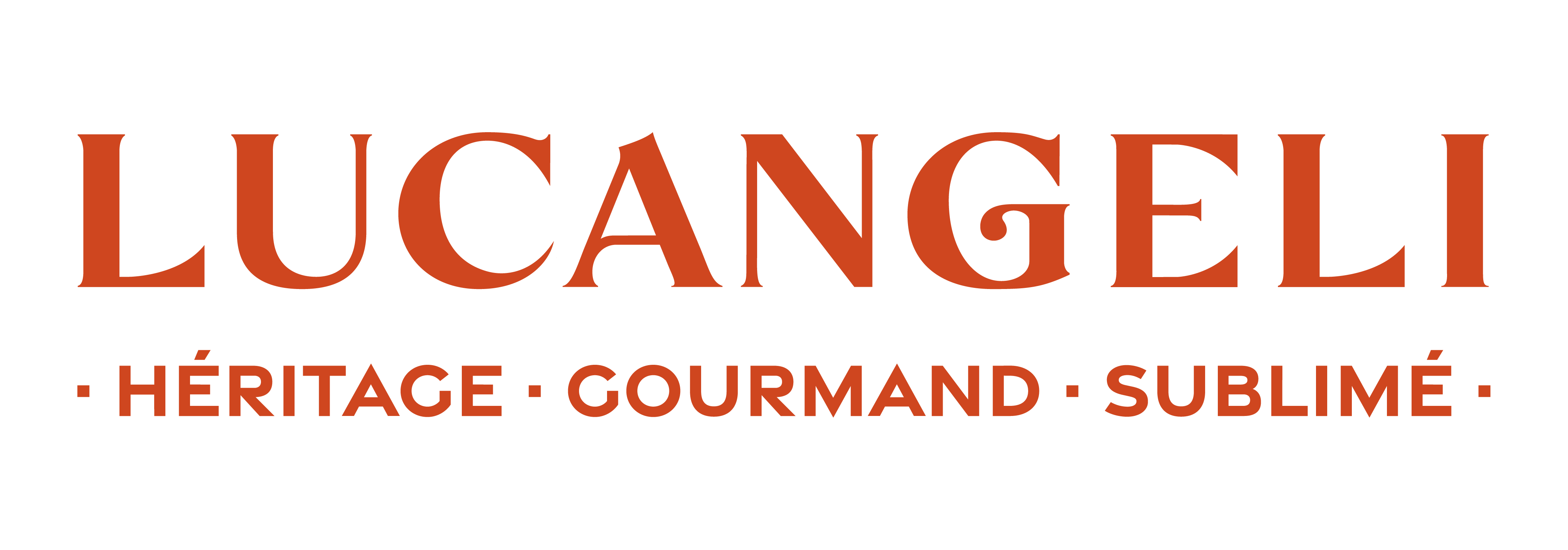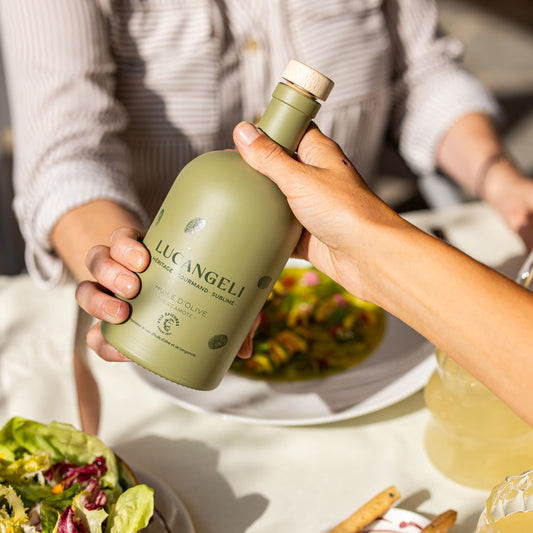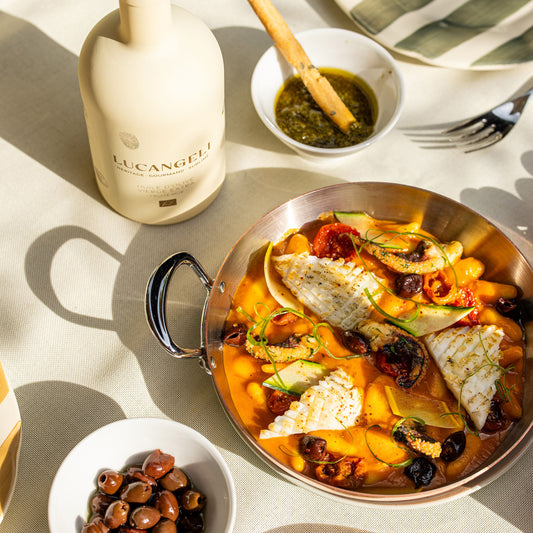Olive oil is a key element of the Mediterranean diet and cuisine, known for its countless benefits for health and well-being . It is obtained by cold pressing green olives , which preserves all its precious nutrients . This oil, rich in healthy fats such as monounsaturated fatty acids and omega-3 , contributes to a balanced diet and protects the body against various diseases. It is also rich in antioxidants , vitamin E and vitamin K , which have beneficial properties for the skin, hair and immune system.
The history and use of olive oil
Olive oil , a central ingredient of the Mediterranean diet , has been valued since ancient times for its richness in nutrients. Traditionally, it has been used to aid digestion , nourish and moisturize the skin, treat skin conditions such as acne , and as a powerful anti-inflammatory , particularly in the case of arthritis . Nowadays, thiscold-pressed oil is also valued in the cosmetics industry for its moisturizing properties and as a natural sunscreen. In cooking, extra virgin olive oil is favored for its unique flavor and health benefits, including cholesterol management and the prevention of cardiovascular disease.
The health benefits of olive oil
Olive oil, a central component of Mediterranean cuisine, is renowned for its numerous health benefits. Rich in essential nutrients such as vitamins E and K, it also offers numerous healing properties thanks to its high antioxidant and polyphenol content. Extracted by cold pressing green olives, this virgin oil is a valuable source of healthy fats, essential for our overall well-being.
Improved heart health
Olive oil is rich in monounsaturated fats, especially oleic acid, which help lower bad cholesterol levels and increase good cholesterol. By including this oil in your daily diet, you contribute to the prevention of cardiovascular disease. In addition, its antioxidants, such as polyphenols, have a protective effect against hypertension and lipid oxidation, thus reducing the risk of plaque formation in the arteries. Therefore, olive oil contributes to your heart health and longevity.
Contribution to weight loss
Despite its high calorie content, olive oil may be beneficial for weight loss. This is because the monounsaturated fats it contains are more likely to be used by the body as a slow-burning energy source, rather than being stored as body fat. Additionally, it has a satiating effect that can help reduce total calorie intake. As part of a balanced diet, adding olive oil to your meals will promote feelings of fullness and help you manage your weight.
The benefits of olive oil for skin and hair
Olive oil, beyond its many nutritionally-related healing properties, is also known for its exceptional benefits for skin and hair. Rich in nutrients, it is a treasure of Mediterranean cuisine that also finds its place in wellness and beauty routines.
Skin hydration and protection
Olive oil, especially when extracted by cold pressing, is rich in vitamins E and K, two essential nutrients for skin health. Vitamin E is a powerful antioxidant that helps neutralize free radicals that can damage the skin and accelerate the aging process. Additionally, olive oil is an excellent source of monounsaturated fats and polyphenols, which are known for their anti-inflammatory and antimicrobial properties. These nutrients help nourish the skin, improve its elasticity, and protect it from damage caused by the sun, pollution, and other environmental factors. Furthermore, olive oil has also been used as a natural treatment for various skin problems, such as acne and eczema, thanks to its moisturizing and soothing properties.
Using Olive Oil for Hair
When it comes to hair, olive oil is an excellent natural hair serum. It can help repair damaged hair, prevent split ends, and increase shine. The monounsaturated fats in olive oil can penetrate the hair shaft, providing deep hydration and helping to strengthen hair from within. The vitamins and antioxidants it contains can also contribute to scalp health, promoting hair growth and preventing hair loss. Furthermore, olive oil can also be used as a natural treatment for dandruff, thanks to its moisturizing and anti-inflammatory properties. For all these reasons, olive oil is often included in quality hair care products, providing intense nutrition and protection to the hair, while promoting its beauty and health.
The benefits of olive oil for cooking
Olive oil is a prime ingredient in cooking , known for its richness in nutrients and healthy fats . It is particularly rich in monounsaturated and omega-3 fatty acids, which are beneficial for the cardiovascular system . It also contains antioxidants such as polyphenols and vitamin E, which help fight cell aging. In addition, olive oil is a valuable source of vitamin K and calcium, which are essential for maintaining bone health. Finally, it has anti-inflammatory properties and aids digestion . It can be used for cooking with oil, as an oil dressing, or even as a base for an oil soap.
Use of olive oil in Mediterranean cuisine
Olive oil is a pillar of the Mediterranean diet , renowned for its health and wellness benefits. It is used in a multitude of recipes, from salads to stews, pasta, and pizza. Olive oil adds a unique flavor and incomparable softness to food. It is also valued for its cooking properties, as it withstands heat well without degrading. Extra virgin olive oil, obtained by cold pressing, is particularly prized for its rich taste and high nutrient content.
How to Choose a Good Olive Oil for Cooking
To fully enjoy the benefits of olive oil, it's important to choose a good quality oil. Chooseextra virgin olive oil , which is obtained by cold-pressing the olives. This process preserves the oil's nutrients and aromas as much as possible. Read the label carefully: it should mention "extra virgin" and the origin of the olives. Avoid oils that don't mention this information or that contain additives. Finally, choose organic oil if possible, to ensure environmentally friendly and pesticide-free cultivation.
Olive oil, that precious golden substance, has long been a secret of Mediterranean cuisine. It is produced by cold-pressing green olives, giving it a high concentration of essential nutrients. Olive oil's richness in monounsaturated fatty acids and antioxidants, especially polyphenols, makes it a key element for well-being and health. It is a dietary product that significantly improves cardiovascular health, helping to regulate cholesterol levels and prevent hypertension. Furthermore, olive oil has proven to be a powerful anti-inflammatory, very beneficial for those suffering from arthritis and other inflammatory diseases.
In addition to its health benefits, olive oil has benefits for the skin and hair. It contains vitamin E, an antioxidant that helps fight skin aging. When applied topically, it provides intense hydration and natural sun protection. Olive oil is also rich in vitamin K and calcium, nutrients essential for maintaining bone health. It is even used to make oil soaps, known for their softness and moisturizing properties. In the medicinal field, olive oil is cited for its healing properties, particularly in the prevention of Alzheimer's disease and as an anticancer agent. Finally, it is a key element in the Mediterranean diet, recognized for its numerous health benefits.










 lucangeli.it
lucangeli.it


